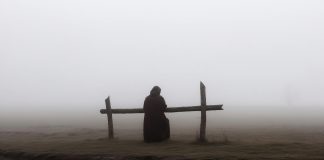Food for life
A lot is said and written about food, and a fair share of the promises we make are related to it. We might decide to eat more healthfully or perhaps we wish to diminish food waste. Unfortunately, our promises are often quickly forgotten, because destructive habits are hard to forsake. There are, however, people who have found ways to transform not just their...
Happiness is always available
How do you respond when someone asks: "How are you"? With a slight shrug and an unconvincing "Fine"? What else could you say, when you are not convinced that your daily life adds up to anything more than that?
The lens you see me through
Ask any cinematographer what gets them excited, and I guarantee there’s a fair chance they’ll answer with “lenses”. Having spent many years studying film and many more practising it, I can safely say that I now understand why this is—and it’s probably the first response you’d hear from me if you asked me the same question.
The lost art
I am standing outside a cavernous hall, holding a clear plastic bag that contains several pens and pencils. My head is pounding; I’m wide-eyed with fear; my heart is about to burst out of my chest; and I have a sinking feeling in the pit of my stomach. The reason? I’ve forgotten to study for an exam that’s about to begin!
Why touch matters
Immigrating to the United Kingdom was a bold move. As a Latina, I had a lot to get used to, from cars driving on “the wrong side of the road” and the constant weather talk to the beautiful, fluffy texture of Yorkshire puddings. But one of the most shocking elements of my new culture was how seldom people hugged each other. During my...
The mad monk and the case for good theology
The Oxford Online Dictionary describes theology as “the study of the nature of God and religious belief”. That’s a helpful understanding, but let’s begin with some seriously bad theology as practised by the Russian mystic and faith healer Grigori Yefimovich Rasputin.
Cringeworthy!
When a visitor walks into your church, what will they see? What will they hear? How will they feel?
The sprouts of genomics
Although the results do not seem spectacular yet, at least to the majority of the population, probably the most remarkable advances in the field of healthcare in the last 30 years relate to the mapping of the human genome (completed in 2003), the genome of other animal and plant species, and the development of bioinformatics.
Who is educating your child?
Education is essential for the survival of any social group, since a community ensures its existence and development only by passing on to the next generation the knowledge it has accumulated, the power it derives from it and its ideological aspirations.
Managing screen time
Are you tired of feeling guilty for letting your kid play with an iPad or watch a show on Netflix? Perhaps you’re worried about the impact screen time has on them.
How disposable are you?
How do we value a human’s life? Should we rate lives on their value to their community? That would mean a life-saving surgeon would have more value than someone living on the street. Or is it potential—which would make a baby more valuable than a 50-year-old? What about the value we place on those later in life versus those at the end?
The one way road cancelled
I was there, I saw him. He was coming towards me mechanically, impassively, coldly. He suddenly stopped in front of me and waited for me to speak. For a moment, I froze. He was tall, thin, his face oval and his eyes blue, slightly sunken under his eyelids. I had met such people before, but there was something special about him.
Back from the brink: A doctor’s struggle with depression
Here’s a disturbing fact: Medical doctors have the highest suicide rate of any profession. It may be uncomfortable to read that in the USA nearly 400 doctors take their life every year. So how does a physician find assistance in a system that seems to be clearly failing its own? I sat down recently with Dr Charles, a fitness enthusiast, soccer fanatic and dad, to...
“You can beat this!” | Milestones on the road from fear to success
He was born in 1935 in Narvik, Norway, beyond the Arctic Circle, at a time when the clouds of war were gathering. In 1940, in the space of a few months, Narvik was controlled by Germany, conquered by the Allies, and then left to the Germans.
Pollution in our own homes is as dangerous as outdoor pollution
Air pollution is the greatest risk factor for both the environment and human health, according to the World Health Organization.


























